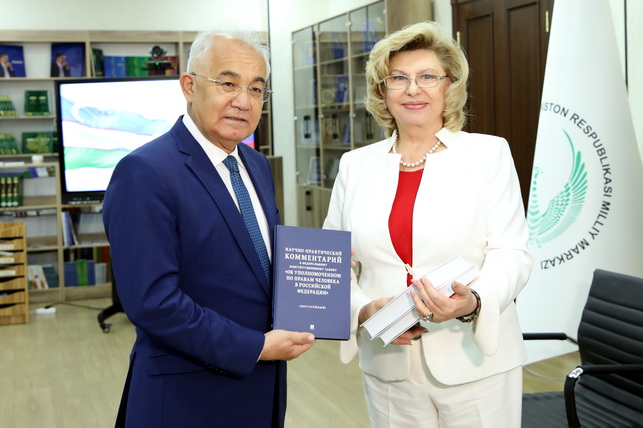
Human Rights Protection in the Modern World: The Experience of Uzbekistan and Russia
Human Rights Protection in the Modern World: The Experience of Uzbekistan and Russia
Tashkent, Uzbekistan (UzDaily.com) — On July 29, the National Center of the Republic of Uzbekistan for Human Rights hosted a legal colloquium titled “Human Rights Protection in the Modern World: The Experience of Uzbekistan and Russia.”
The event was organized as part of the visit to Uzbekistan by Tatyana Moskalkova, Commissioner for Human Rights in the Russian Federation and Chair of the CIS Human Rights Commission.
Opening the colloquium, Akmal Saidov, Director of the National Center for Human Rights of the Republic of Uzbekistan and academician, warmly welcomed the Russian delegation led by Tatyana Moskalkova, as well as other participants. He emphasized the special significance of the colloquium, held in a landmark year — the 80th anniversary of Victory in World War II, the 80th anniversary of the founding of the United Nations, and the 50th anniversary of the OSCE Helsinki Final Act.
He also noted that July 30 is marked globally as the International Day of Friendship and in Uzbekistan as the Day of Friendship of Peoples. Saidov recalled that victory in World War II came at the cost of immense sacrifices, with the most devastating war in human history bringing indescribable grief and suffering across the world. He underlined that during those difficult years, the peoples of Uzbekistan and Russia extended a helping hand to each other, sharing hardships and joys, and making a major contribution to humanity’s just cause.
Saidov stressed that modern challenges such as climate change, food and energy security, trade wars, illegal migration, and social inequality demand united efforts, as only joint action can effectively confront these threats. He noted that in today’s increasingly complex international environment, national human rights institutions in many countries have become an essential part of national human rights protection systems, with their effectiveness depending largely on their legal status.
At present, almost 200 national human rights institutions operate in 150 countries, while more than 1,000 ombudsman offices function in 140 states. Saidov highlighted that there is no single model of a national human rights institution suitable for all countries. While nations can draw on each other’s experiences, these institutions are formed with respect to each country’s national, cultural, and legal traditions.
Uzbekistan was the first country in Central Asia to establish a national human rights institution system. It includes the Parliamentary Commissioner for Human Rights (Ombudsman), the Commissioner for Children’s Rights (Children’s Ombudsman), the Commissioner under the President of Uzbekistan for the Protection of Entrepreneurs’ Rights, and the National Center for Human Rights. Uzbekistan’s experience in building such institutions has been positively received by the international community and academic circles, attracting study and interest abroad. Article 56 of the updated Constitution of Uzbekistan affirms: “National human rights institutions complement existing forms and means of protecting human rights and freedoms, contribute to the development of civil society, and enhance the culture of human rights. The state creates conditions for their effective functioning.”
The keynote address was delivered by Tatyana Moskalkova. Expressing gratitude to the leadership of the National Center for the opportunity to speak, she noted that the institution of the Commissioner for Human Rights in Russia is one of the youngest yet most dynamically developing democratic institutions in the field of human rights protection.
For reference: Professor and Honored Lawyer of the Russian Federation, Tatyana Moskalkova, was elected Commissioner for Human Rights in 2016. Her career spans from working in the pardon department of the Presidium of the Supreme Soviet of the RSFSR to serving as a Major General of Police and a Member of Parliament.
Today, she is one of the architects of Russia’s two-tier state human rights protection system. On her initiative, laws were adopted that strengthened the legal foundations of regional ombudsman activities. She also established the scientific and organizational basis for a permanent professional development system for ombudsman staff and initiated the creation of a Human Rights Research and Education Center.
Thanks to her leadership, the Eurasian Ombudsman Alliance has been operating successfully. Moreover, she was elected the first Chair of the recently created CIS Human Rights Commission, which includes two representatives from each of seven CIS countries, including Uzbekistan, represented by the Ombudsman and the National Center for Human Rights.
It is worth noting that since 2019, a memorandum of cooperation has been successfully implemented between the Commissioner for Human Rights in Russia and Uzbekistan’s National Center for Human Rights. Within its framework, the parties have actively cooperated on protecting citizens’ rights, exchanging information, organizing and participating in human rights events. Russian representatives’ participation in the Samarkand Human Rights Forum has become a good tradition. During the pandemic, cooperation between the two countries’ human rights institutions helped citizens return home and restore their documents. As a mark of recognition, Tatyana Moskalkova became one of the first recipients of Uzbekistan’s high state award in the field of human rights — the badge “For the Protection of Human Rights,” established at the initiative of President Shavkat Mirziyoyev.
The colloquium also presented information on the achievements of Uzbekistan’s National Human Rights Strategy, discussing national experience in protecting human rights, prospects for further development of national human rights institutions, recent legislative innovations, and opportunities for Uzbekistan–Russia cooperation in this field.
The event concluded with Tatyana Moskalkova’s visit to the “House of Human Rights,” established last year under the National Center for Human Rights of Uzbekistan. The honored guest was presented with newly published books on human rights.